Are you looking for small parrots that are full of charm, personality, and intelligence? These feathered companions make excellent pets, especially for new owners who want a bird that is easy to care for and fun to interact with. Unlike larger parrots, small parrots require less space, are easier to train, and often have lower maintenance needs. Whether you want a talkative bird, a playful companion, or a low-maintenance pet, there’s a perfect small parrot for you.
In this guide, we’ll explore the top 10 small parrots for new owners and highlight their unique traits. From the affectionate Cockatiel to the intelligent Quaker Parrot, each bird on this list brings something special to the table. If you’re ready to find a feathered friend that suits your lifestyle, keep reading to discover which small parrot is the best match for you!
Why Small Parrots Make Great Pets
If you’re considering adding a feathered companion to your home, small parrots offer a perfect blend of charm, intelligence, and manageability. Many people love parrots but hesitate to own one due to the high-maintenance nature of large species like African Greys or Macaws. Fortunately, small parrots provide all the personality and companionship of their larger relatives while being much easier to care for. Whether you’re a first-time bird owner or someone looking for an interactive and affectionate pet, small parrots bring joy without overwhelming responsibility.
Let’s explore why small parrots are fantastic pets, especially for new owners.
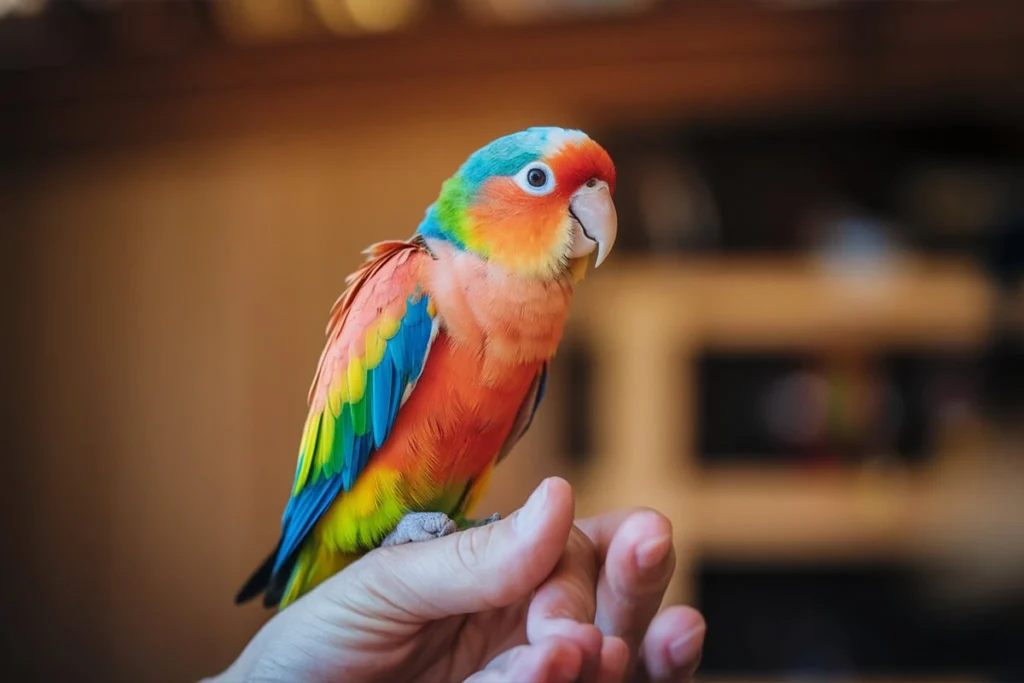
Friendly and Social: Small Parrots Love Companionship
One of the biggest reasons people fall in love with small parrots is their friendly and social nature. Unlike some other pet birds that prefer solitude, many small parrot species actively seek out interaction with their owners.
Most small parrots, such as Cockatiels, Lovebirds, and Budgies, form strong emotional bonds with their human caregivers. They enjoy perching on shoulders, nuzzling against fingers, and even chirping excitedly when they see their favorite person enter the room. These birds are not just pets; they become loyal companions who thrive on affection.
- Budgerigars (Budgies) chatter endlessly and often mimic their owner’s voice, creating an adorable form of communication.
- Cockatiels whistle cheerful tunes, recognizing their owner’s presence with excited chirps and head bobs.
- Lovebirds live up to their name by forming deep attachments, showing affection by preening their owner’s hair or cuddling into their necks.
Small parrots also love socializing with other birds. If you have space and time for multiple birds, species like Lineolated Parakeets (Linnies) or Bourke’s Parrots enjoy the company of feathered friends. However, even single parrots can thrive with enough attention from their owner, making them a great choice for someone who wants a pet with personality and love to give.
If you’re looking for a pet that enjoys your presence, responds to your voice, and actively engages with you, small parrots are a wonderful choice.
Small Parrots Are Intelligent and Easy to Train: Clever Birds That Love Learning
Small parrots are surprisingly intelligent and quick learners. Despite their tiny size, many of these birds display problem-solving skills, memory retention, and an eagerness to interact with their environment. Owners can teach them a wide variety of tricks, from simple behaviors like stepping onto a hand to complex tasks like retrieving objects.
Some small parrots, like the Indian Ringneck Parakeet and Quaker Parrot, are known for their exceptional ability to mimic human speech. With consistent training, they can develop a vocabulary of dozens—sometimes even hundreds—of words! But even species that aren’t known for talking, like Green-cheeked Conures or Lovebirds, can learn whistles, simple commands, and fun tricks with patience and positive reinforcement.
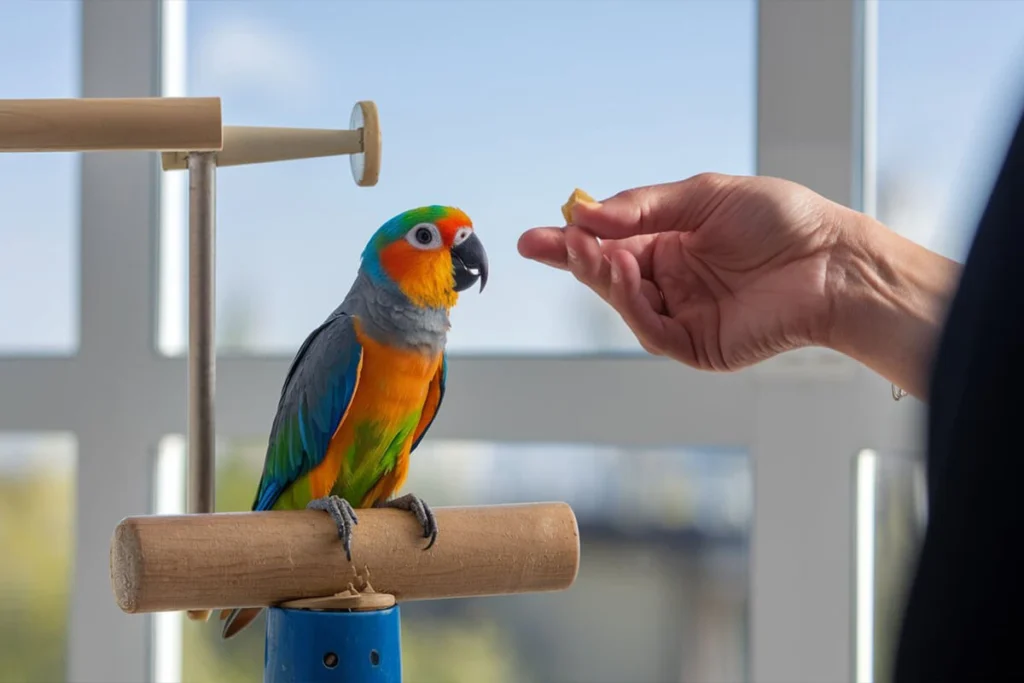
Training small parrots is not difficult, especially when using their favorite treats as motivation. Owners can start with basic commands like:
- “Step up” – Teaching the bird to step onto your finger or hand.
- “Target training” – Encouraging the bird to touch a stick or object in exchange for a reward.
- “Recall training” – Training the bird to fly to you when called.
Since small parrots are highly responsive, they pick up new tricks quickly when owners provide regular training sessions. The more mental stimulation these birds receive, the happier and more engaged they become.
Beyond tricks, small parrots can also solve puzzles, recognize colors and shapes, and learn their names. Some even form strong associations between words and actions, responding to commands in a way that feels almost like a conversation.
For new owners who enjoy interacting with their pets, small parrots offer endless entertainment and rewarding experiences.
Small Parrots Are Low-Maintenance Compared to Larger Parrots: Easier to Care For
One of the most significant advantages of choosing a small parrot is the ease of care compared to larger parrot species. While all parrots require love, time, and commitment, small parrots are generally less demanding in terms of space, food, and maintenance.
1. Smaller Space Requirements
Larger parrots, like Macaws or Cockatoos, need huge enclosures and dedicated play areas. In contrast, most small parrots do well in modest-sized cages, making them ideal for apartments or homes with limited space. A properly sized cage with plenty of toys and perches is enough to keep them comfortable.
Additionally, because small parrots are lightweight, they can fly indoors without the risk of damaging furniture or injuring themselves as easily as large birds might. Their manageable size makes them easier to handle, reducing stress for new owners.
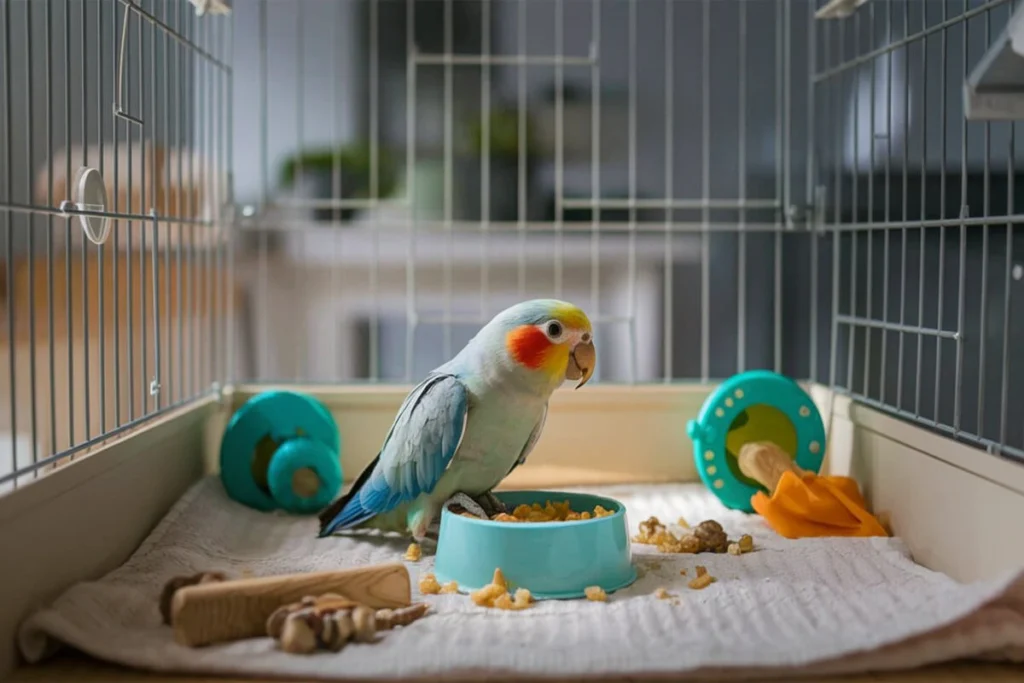
2. Less Mess and Maintenance
Cleaning up after small parrots is far easier than dealing with large bird species. Since they have smaller droppings, their cages require less frequent deep cleaning. A daily spot-clean and a full cage cleaning once a week typically keep their environment fresh and hygienic.
Small parrots also tend to chew less destructively than their larger counterparts. While they still love shredding toys and nibbling on wooden perches, they don’t have the powerful beaks that can destroy furniture or electrical wires as easily as large parrots like Macaws.
3. Affordable and Manageable Diet
Feeding a small parrot costs significantly less than feeding a large parrot. Their diet consists of:
- High-quality pellets (forming the majority of their nutrition).
- Fresh fruits and vegetables (such as apples, carrots, and leafy greens).
- Occasional seeds and nuts as treats.
Since they eat much smaller portions than large parrots, food costs remain low, making them a budget-friendly pet option.
4. Lower Noise Levels
Many large parrots are extremely loud, with ear-piercing screams that can disturb neighbors or household members. While some small parrots (like Quakers and Conures) can be chatty, their noise levels are far more manageable. Species like Pionus Parrots, Lineolated Parakeets (Linnies), and Bourke’s Parrots are among the quietest parrot species, making them perfect for owners who prefer a calmer home environment.
Top 10 Small Parrots for New Owners
If you’re considering a small parrot as a pet, you’re in for a delightful experience. These birds may be tiny, but they have big personalities, vibrant colors, and charming behaviors that make them wonderful companions. Some are natural chatterboxes, while others prefer quiet companionship. Some love cuddles, and others enjoy playful antics. No matter what kind of personality you’re looking for, there’s a small parrot breed that’s perfect for you.
Let’s dive into the top 10 small parrots for new owners and explore their unique traits, care requirements, and why they make fantastic pets.
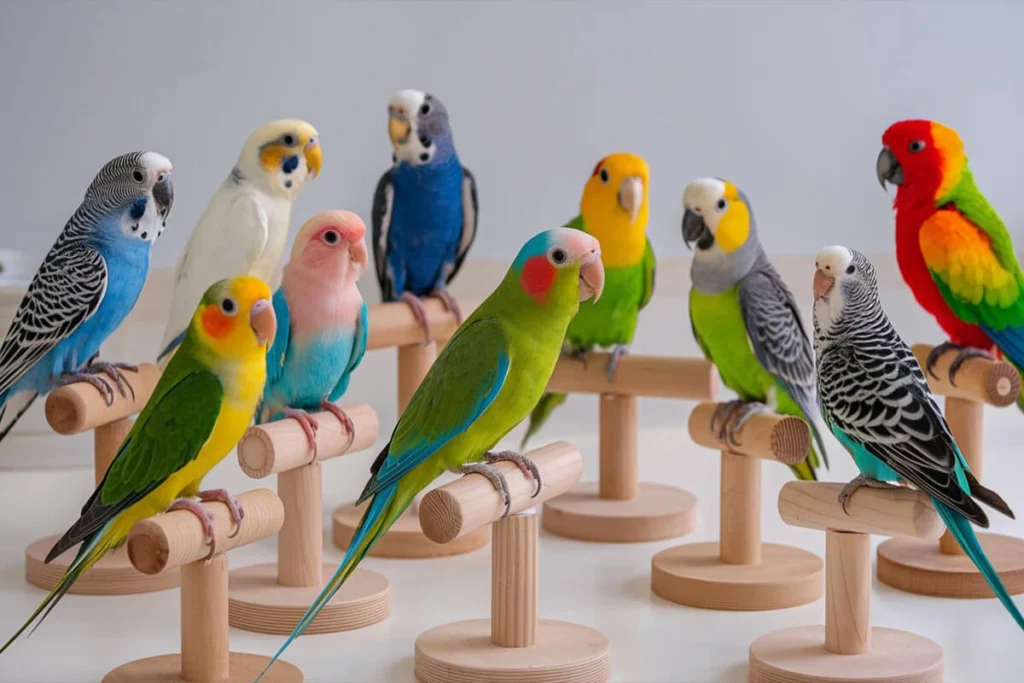
1. Budgerigar (Budgie) – The Chatty and Playful Companion
Budgies are very popular pet birds all over the world, and there are many good reasons for this! These tiny parrots pack a huge personality into a small body, making them ideal for beginners. Their playful nature, affectionate behavior, and ability to mimic human speech make them a top choice for new bird owners.
Why Budgies Make Great Pets:
- Highly Social: Budgies thrive on interaction with their owners and enjoy chirping, whistling, and even talking.
- Easy to Train: With patience and treats, they can learn tricks, step-up commands, and even words or phrases.
- Low Maintenance: Compared to larger parrots, Budgies have simple dietary and cage-cleaning needs.
- Colorful Variety: They come in a range of beautiful colors, from bright yellows and greens to blues and whites.
What to Consider Before Getting a Budgie:
- They need daily social interaction to stay happy.
- While they can learn words, their voices are softer than larger talking parrots.
- Budgies enjoy the company of other birds, so consider getting a pair if you have a busy lifestyle.
If you want a low-maintenance, friendly, and intelligent small parrot, the Budgie is a perfect choice!
2. Cockatiel – The Affectionate Whistler
Cockatiels are gentle, affectionate, and full of personality. With their charming crests and expressive faces, they easily win over bird lovers. They are one of the best parrots for beginners, offering companionship and entertainment without being overly demanding.
Why Cockatiels Make Great Pets:
- Affectionate and Cuddly: Cockatiels love perching on their owners and enjoying head scratches.
- Great Whistlers: Males, in particular, can learn to whistle and mimic tunes.
- Low Noise Levels: While they are vocal, their calls are not as loud as other parrot species.
- Easy to Care For: They thrive on a simple diet of pellets, vegetables, and seeds.
What to Consider Before Getting a Cockatiel:
- Cockatiels can develop strong bonds with their owners and may become lonely without regular interaction.
- They produce a fine dust from their feathers, which can cause allergies in some people.
- While they can learn a few words, they are not the best talkers.
If you want a gentle and loving companion that whistles sweet melodies, a Cockatiel might be the perfect pet for you.
3. Lovebird – The Small Parrot with a Big Heart
Lovebirds are tiny but full of personality. These energetic and affectionate parrots love to interact with their owners and often form deep bonds with their human caregivers. Despite their small size, they are fearless, playful, and incredibly entertaining to watch.
Why Lovebirds Make Great Pets:
- Strong Bonding: Lovebirds get their name from their affectionate nature—they love companionship!
- Energetic and Playful: They enjoy toys, puzzles, and exploring their environment.
- Compact Size: They don’t require a large cage, making them great for apartments.
- Quiet Compared to Other Parrots: They chirp and chatter but aren’t as noisy as larger species.
What to Consider Before Getting a Lovebird:
- They need daily interaction to stay happy—without attention, they can become moody.
- While they can live alone, they do best with a companion (either another Lovebird or a dedicated owner).
- Their small size means they can easily escape through tiny openings, so a secure environment is essential.
If you want a small, active, and loving parrot that thrives on companionship, the Lovebird is a great choice!
4. Parrotlet – The Tiny Dynamo
Parrotlets may be small, but they have huge personalities. Often described as “miniature Amazons,” these birds are fearless, independent, and full of energy. They form strong bonds with their owners and can be trained to perform tricks and even talk.
Why Parrotlets Make Great Pets:
- Confident and Curious: They explore everything and love learning new tricks.
- Low-Maintenance: They require less space and food than larger parrots.
- Playful and Active: They enjoy climbing, chewing, and playing with toys.
- Can Learn to Talk: Though not as clear as Budgies, some can mimic words and phrases.
What to Consider Before Getting a Parrotlet:
- Parrotlets can become territorial and may not get along well with other birds.
- They have strong personalities—they need training and socialization to prevent aggression.
- Despite their small size, they need plenty of mental stimulation to stay happy.
If you want a bold, intelligent, and interactive small parrot, a Parrotlet might be the perfect fit!
5. Green-cheeked Conure – The Playful Clown
Green-cheeked Conures are among the most playful and affectionate small parrots. They are known for their silly antics, goofy personalities, and love of attention. If you want a bird that loves to interact and is always up for fun, this species is a fantastic choice.
Why Green-cheeked Conures Make Great Pets:
- Affectionate and Playful: They enjoy cuddling, playing, and spending time with their owners.
- Quiet Compared to Other Conures: While they make noise, they are not as loud as Sun Conures.
- Highly Trainable: They can learn tricks, recall commands, and even mimic some words.
- Loyal and Bonding: Once they bond with an owner, they remain affectionate and loyal companions.
What to Consider Before Getting a Green-cheeked Conure:
- They require daily interaction to prevent boredom and loneliness.
- They go through nippy phases, especially when young, but proper training helps control this behavior.
- Though quieter than some parrots, they still vocalize, so they might not be ideal for noise-sensitive homes.
If you want a playful and loving parrot that enjoys being part of your daily life, a Green-cheeked Conure is a fantastic choice!
6. Quaker Parrot – The Social and Talkative Genius
Quaker Parrots, also known as Monk Parakeets, are famous for their talking ability, intelligence, and playful personalities. They are one of the best small parrot species for owners who want a bird that interacts, learns tricks, and mimics human speech exceptionally well.
Why Quaker Parrots Make Great Pets:
- Exceptional Talkers: They can develop a vocabulary of hundreds of words with proper training.
- Highly Social: They love attention, forming deep bonds with their owners.
- Energetic and Playful: They enjoy problem-solving, puzzle toys, and interactive playtime.
- Funny and Expressive: Their quirky personalities make them incredibly entertaining.
What to Consider Before Getting a Quaker Parrot:
- Can Be Noisy: They have loud, persistent voices, which may not suit quiet households.
- Requires Consistent Training: Without proper socialization, they can develop territorial behaviors.
- Legal Restrictions in Some Areas: Some states and countries ban Quaker Parrots due to their tendency to form wild colonies. Always check local laws before adopting one.
If you want a highly intelligent, talkative, and fun-loving small parrot, the Quaker Parrot is an excellent choice!
7. Pionus Parrot – The Gentle and Quiet Companion
Pionus Parrots are calm, affectionate, and easygoing, making them one of the best small parrots for new owners who prefer a more relaxed pet. Unlike some other parrot species, Pionus Parrots are not overly demanding and have a sweet, quiet demeanor.
Why Pionus Parrots Make Great Pets:
- Quiet Nature: They are one of the least noisy parrot species, perfect for apartments.
- Affectionate but Independent: They enjoy human company but don’t demand constant attention.
- Robust Health: Pionus Parrots are hardy birds with fewer health issues than some other species.
- Beautiful Colors: Their deep blue, green, and bronze feathers make them a stunning addition to any home.
What to Consider Before Getting a Pionus Parrot:
- Not the Best Talkers: They can learn a few words, but their speech is not as clear as Quakers or Budgies.
- Slight Wheezing Sound: Pionus Parrots sometimes make a wheezing noise when excited, which can concern first-time owners—but it’s normal for them.
- Less Playful Than Some Species: They enjoy interaction but are not as high-energy as Conures or Lovebirds.
If you want a gentle, quiet, and affectionate parrot that doesn’t demand constant attention, a Pionus Parrot is a fantastic choice!
8. Lineolated Parakeet (Linnie) – The Calm and Sweet Parrot
Lineolated Parakeets, or Linnies, are one of the most easygoing and affectionate small parrots. They have a calm personality and are much quieter than other parakeet species, making them perfect for new owners who prefer a more relaxed pet.
Why Lineolated Parakeets Make Great Pets:
- Extremely Quiet: They chirp softly and don’t scream like some other parrots.
- Cuddly and Affectionate: They love snuggling into their owners and sitting on their shoulders.
- Mild-Mannered and Gentle: Unlike some small parrots, they rarely bite or act aggressively.
- Good Talkers: While they don’t talk as much as Budgies, some learn words and phrases with training.
What to Consider Before Getting a Linnie:
- Less Playful Than Other Parrots: They enjoy gentle interactions but don’t engage in as much rough-and-tumble play as Lovebirds or Conures.
- Can Be Shy at First: They take time to warm up to their owners, so patience is key.
- Need a Varied Diet: They thrive on pellets, fresh fruits, vegetables, and occasional seeds.
If you want a sweet, quiet, and cuddly small parrot that is easy to care for, a Linnie is an excellent choice!
9. Bourke’s Parrot – The Gentle and Low-Maintenance Bird
Bourke’s Parrots are one of the calmest and most low-maintenance parrot species, making them perfect for beginners. Unlike more energetic parrots, Bourke’s Parrots have a gentle and peaceful demeanor, preferring to observe their surroundings rather than engage in hyperactive play.
Why Bourke’s Parrots Make Great Pets:
- Very Quiet: They are among the least noisy parrots, ideal for apartments or shared living spaces.
- Easygoing Nature: They don’t demand constant attention and are happy to entertain themselves.
- Beautiful Coloring: Their soft pink, blue, and brown feathers give them a unique, elegant appearance.
- Low Maintenance: They don’t require as much social interaction as other small parrots.
What to Consider Before Getting a Bourke’s Parrot:
- Not Very Playful: They are more relaxed and less active than Lovebirds or Budgies.
- Limited Talking Ability: While they chirp sweetly, they don’t typically mimic human speech.
- Dusk and Dawn Activity: They are most active during sunrise and sunset but stay quiet throughout the day.
If you want a calm, low-maintenance, and peaceful small parrot, a Bourke’s Parrot is a great choice!
10. Indian Ringneck Parakeet – The Intelligent and Elegant Talker
Indian Ringneck Parakeets are known for their sleek appearance, high intelligence, and excellent talking ability. While they require more attention than some of the other birds on this list, they are incredibly rewarding pets for owners willing to invest time in training.
Why Indian Ringneck Parakeets Make Great Pets:
- Excellent Talkers: They can learn full sentences and have one of the clearest speaking voices among parrots.
- Beautiful Appearance: Their long tail feathers and striking colors make them one of the most elegant parrot species.
- Highly Intelligent: They excel at problem-solving, learning tricks, and interacting with their environment.
- Strong Bonding: Once they trust an owner, they become deeply affectionate and loyal.
What to Consider Before Getting an Indian Ringneck:
- Requires Patience: They go through a “bluffing phase” as juveniles, where they may become nippy, but this can be trained out with patience.
- Can Be Independent: Unlike Cockatiels or Lovebirds, they enjoy social interaction but also value their alone time.
- Moderate Noise Level: They are not as loud as Quakers but can be chatty throughout the day.
If you want a beautiful, intelligent, and talkative small parrot, an Indian Ringneck Parakeet is a fantastic pet!
Conclusion
Choosing the right small parrot as a pet can be an exciting but important decision. Each bird has its own unique personality, energy level, and care requirements. Some, like Budgies and Cockatiels, make excellent beginner birds due to their affectionate nature and easy maintenance. Others, such as Lovebirds and Green-cheeked Conures, bring high-energy playfulness and require more attention to keep them happy.
If you want a talkative companion, Quaker Parrots and Indian Ringneck Parakeets stand out with their exceptional mimicry skills. For those who prefer a quiet and gentle pet, Pionus Parrots, Bourke’s Parrots, and Lineolated Parakeets offer calm, easygoing companionship. Some birds, like Parrotlets, may be small in size but have strong, bold personalities, requiring firm training and interaction.
Before bringing home a small parrot, consider your lifestyle and the time you can dedicate to socialization, training, and enrichment. Birds thrive on routine, mental stimulation, and bonding with their owners. If you have a busy schedule, a lower-maintenance species like a Linnie or Bourke’s Parrot may suit you best. However, if you want an interactive, playful bird that enjoys cuddles and learning tricks, a Green-cheeked Conure or a Cockatiel could be a perfect choice.
No matter which small parrot you choose, giving them proper care, a nutritious diet, and plenty of attention will help them become a loving, long-term companion. With patience and commitment, your bird will develop a deep bond with you, bringing joy, entertainment, and companionship into your home for years to come.
Discover The Purple Parrot Birds From Here.
Find Out More about Other Pets and breeds From HERE!
Find Out the Best stuff for your Pet On Pet MD Official
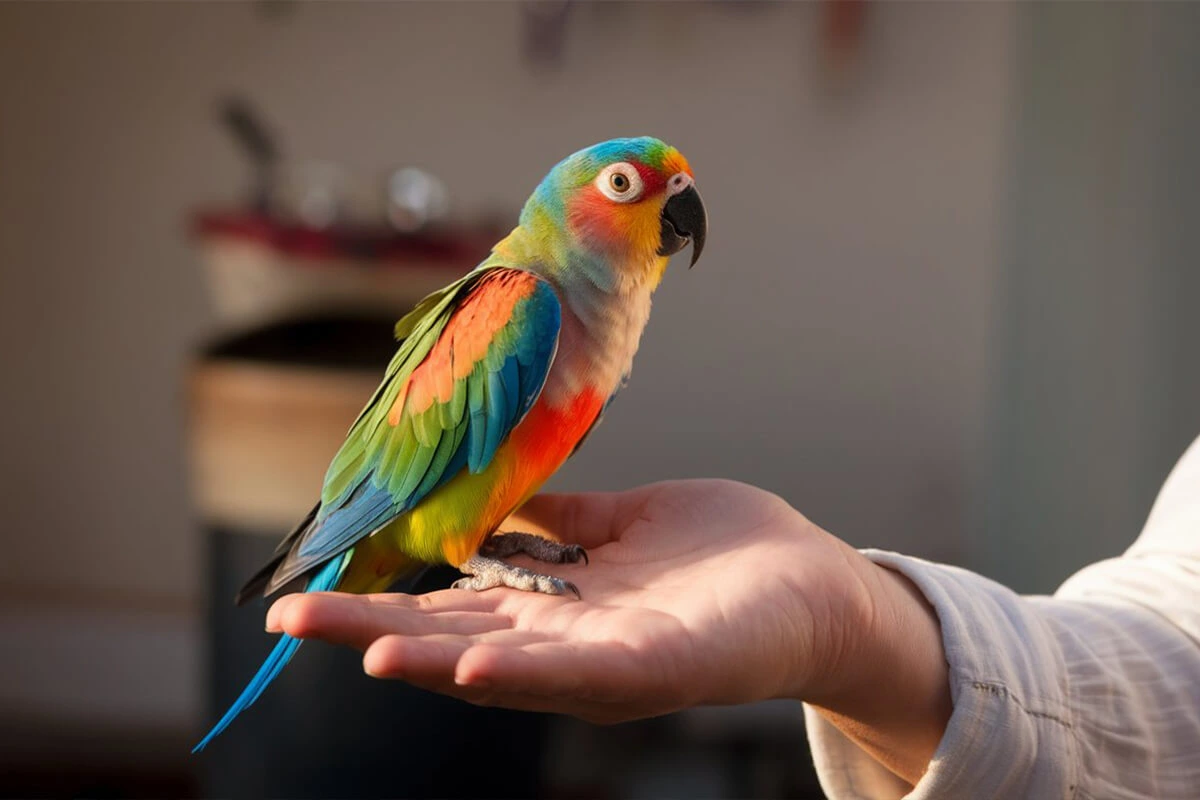
4 thoughts on “Top 10 Small Parrots for New Owners with Charm You must See”
Comments are closed.